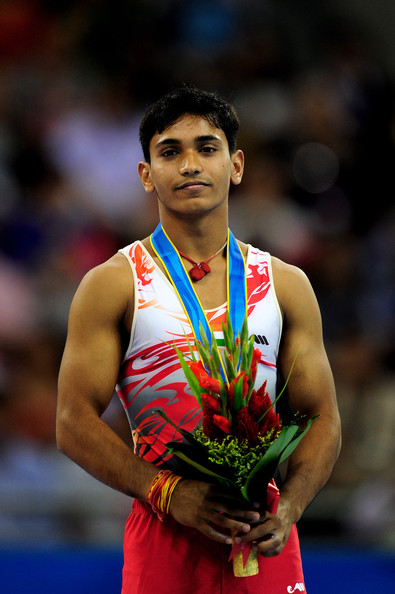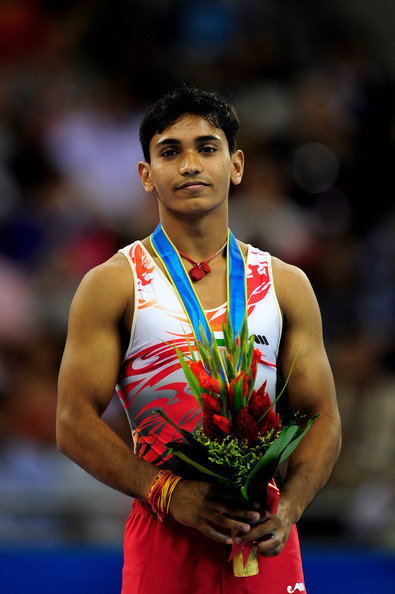Syque Caesar was selected to represent Bangladesh at the 2012 Olympic Games
 Senior Syque Caesar was selected to represent Bangladesh in artistic gymnastics at the 2012 Olympic Games after capturing the country’s first international gold medal, at the fourth Central South Asian Artistic Gymnastic Championships on Dec. 31, 2011. Caesar won the parallel bars event, took silver on the vault and bronze in floor exercise to capture bronze in the all-around competition. Caesar, who missed much of the 2012 season with injury, captured the 2011 Big Ten parallel bars crown and owns career bests of 15.65 on both vault and parallel bars.
Senior Syque Caesar was selected to represent Bangladesh in artistic gymnastics at the 2012 Olympic Games after capturing the country’s first international gold medal, at the fourth Central South Asian Artistic Gymnastic Championships on Dec. 31, 2011. Caesar won the parallel bars event, took silver on the vault and bronze in floor exercise to capture bronze in the all-around competition. Caesar, who missed much of the 2012 season with injury, captured the 2011 Big Ten parallel bars crown and owns career bests of 15.65 on both vault and parallel bars.
The United States-born University of Michigan student was forced to change his plans for 2012 in April after receiving an invitation to represent Bangladesh at London 2012.
The country is the most populous nation (164.4m) not to have won a medal at the Games. Although Caesar faces a tough task to end this unwanted distinction, he hopes his inclusion may lead to a change in fortunes for his ancestral home.
“Bangladesh loves sport,” he told BBC Sport. “My father used to play for the national football team and football was the country’s main passion. That died down and now the country loves cricket.
“Gymnastics isn’t really such a popular sport around the globe anyway, but hopefully I’ll be the guy that kick-starts a programme in the country.
“Bangladesh is willing to do everything to get as many athletes as it can to the Olympics, but having the resources to prepare athletes for the Games is quite new for them.”
Caesar, who started gymnastics at the age of six, rose to prominence in 2011 when he collected a hatful of medals, including gold in the parallel bars, at the Central South Asian Artistic Gymnastics Championships held in Dhaka, Bangladesh.
It was the first time a Bengali competitor had won an international title in gymnastics.
“There was quite a bit of media attention, although I did enjoy it,” added Caesar, who also competed at the 2011 World Championships in Tokyo.
“I was approached by journalists halfway through that competition. That was a little different. It was quite an experience.”
Caesar was born in Florida and learnt his trade in the United States. Injuries during his career have stalled his progress and in a recent newspaper interview he admitted that it could have prevented him from making the US team.
But the college student is delighted to represent his family’s homeland.
“My dad always wanted me to represent Bangladesh,” added Caesar, whose father adopted the uncommon Bengali surname as a result of being the first child in the country born via Caesarian section.
“At first I wasn’t feeling it, but then I felt the pride of competing for the country.”
Since receiving his invitation, Caesar has increased his training regime from 20 to 35 hours per week. He sees London 2012 as the “final stepping stone” in his gymnastics career.
“I’m going to take in the entire experience from the Olympics – the village, the venues and competing out on the Olympic floor,” he said.
“I just want to go out there and hit my routines. As long as I do my best then I’ll be very happy, regardless of where I’m placed.”
1- How have Michigan, your teammates and coaching staff prepared you to compete in the Olympic Games?
Being able to train alongside 23 other talented gymnasts at Michigan has given me the motivation to train as hard as I can every single day in the gym. My teammates inspire me to continue pushing the envelope and expect a higher standard in my gymnastics. They’ve also helped me gain many different perspectives on the sport which helps to better my gymnastics even further. The coaches have years of experience and have helped me improve at a pace that would not have been possible had I not come to Michigan. Being at the University in general has made me a more focused, organized and independent individual. I have learned to prioritize my goals and manage my time in ways that have contributed to improving both my gymnastics and academics.
2- What are you looking forward to the most about the Olympics?
I’m most looking forward to the overall experience of being able to compete at the Olympics. When you tell someone that you’re a gymnast, the first response you get is “Are you going to the Olympics?” You start to hear people ask you this so much that you just start to laugh it off as it becomes less of a possibility. It’s every young gymnast’s dream to go to the Olympics. But as you grow older in the sport, other things outside of gymnastics become priorities in your life and the Olympic dream slowly dwindles away. Only a handful of gymnasts from each country get to compete at the Olympics every four years; the number of those athletes who compete at more than one Olympics is even smaller. Although I want to have my absolute best performance at the Olympics, I hope to just take it all in and enjoy the Olympic experience as it potentially may not ever happen again.
3- What will representing Bangladesh mean to you?
To me, representing Bangladesh brings a newfound sense of pride. I’ve been living in the United States my entire life and have only visited Bangladesh a handful of times. I didn’t really know how to feel about representing Bangladesh until I competed on Bangladesh soil in December at the 4th Central South Asian Artistic Gymnastics Championships. At this competition I realized how an entire country can be so united through any sport, even gymnastics. I was able to bring hope and honor, not only to my family, but to the entire country of Bangladesh. The support I’ve received has been absolutely tremendous, and it makes me proud to be representing Bangladesh at the 2012 Olympics.
4- How will your training differ leading up to the Olympic Games?
In terms of training, the first goal is to get 100 percent healthy and conditioned well in order to be fully prepared for whatever my training regimen will require from me. I have already started a new summer strength and conditioning program in the weight room to help me to get stronger a lot faster than training solely in the gym. In terms of gymnastics, I don’t see much changing in terms of training. There will definitely be a larger focus on perfection and execution in my gymnastics. I was in great shape at the beginning of the collegiate season, and the plan is to get back to where I was as quickly as possible so that being even better than I was then is easier down the road. It’s also very important for me to have an extremely structured training plan for every practice day leading up to the Olympics. We’re less than 100 days from the first day of competition, so everything that I do from here on out — both in the gym and outside the gym — will factor into my preparation for the Olympics. My schedule will basically revolve around training up until the Olympics.
5- What is your favorite Olympic moment? What kind of memories do you have of the Olympics growing up as a gymnast?
My favorite Olympic moment was when American gymnast Paul Hamm stuck his double-twisting double-layout dismount after a flawless routine on high bar at the 2004 Olympics in Athens. That sealed his all-around gold medal after a huge mistake earlier in the meet on vault made even winning any medal at all near impossible. That was the one Olympic moment that still gives me goose bumps to this day every time I watch that performance on YouTube. Growing up as a gymnast, the 2004 and 2008 Olympics were the two that really made an impact on my life and how I think about gymnastics.

Administrative wrangling and a lax attitude have cost India’s best gymnast Ashish Kumar a chance to represent the country at the London Olympics.
Ashish missed the qualification mark at the 2011 World Championship in Tokyo by less than one per cent, but the Indian authorities could have pushed for a wild card.
Due to their lackadaisical attitude, the wild card has gone to Syque Caesar of Bangladesh. He won a gold medal at the Central South Asian Artistic Gymnastic Championships last year, but was nowhere in Ashish’s league when they competed in Tokyo.
“The Indian Olympic Association (IOA) and the Gymnastics Federation of India (GFI) should have pursued their request for a wild card, which they apparently did not do,” national coach DK Rathore told MAIL TODAY on Saturday.
“The snub has affected Ashish badly. Though he is continuing his training, his morale is badly affected.”
As there was only one wild card each in the men’s and women’s categories, Ashish may have to wait for another four years .
Two rival federations vying for control is also not helping matters.
“We had two separate senior nationals –- one at Allahabad and the other at Rai. The government has also refused to sanction any foreign tours of late. We have missed the four World Cups held so far this year,” Rathore said.
When contacted, GFI general secretary Kaushik J Bidiwala said there was very little that the federation could do in the matter.
“We put our case before the international federation. The International Olympic Committee has a policy of giving wild cards to countries which do not have many sportspersons qualifying for the Games. The Bangladeshi gymnast has benefitted from this provision,” he told MAIL TODAY.
“So many Indians have already qualified for the London Olympics. This seems to have gone against Ashish,” Bidiwala said.
American coach Vladimir Chertkov, under whose guidance Ashish became the first Indian gymnast to win medals at the Commonwealth and the Asian Games, has already left India.
Coach Ashok Mishra, who was in the Indian set-up till last year, said Ashish was not at his best during the Tokyo World Championships.
“He made a few mistakes on the rings due to which his overall score suffered,” Ashish Kumar he said.

